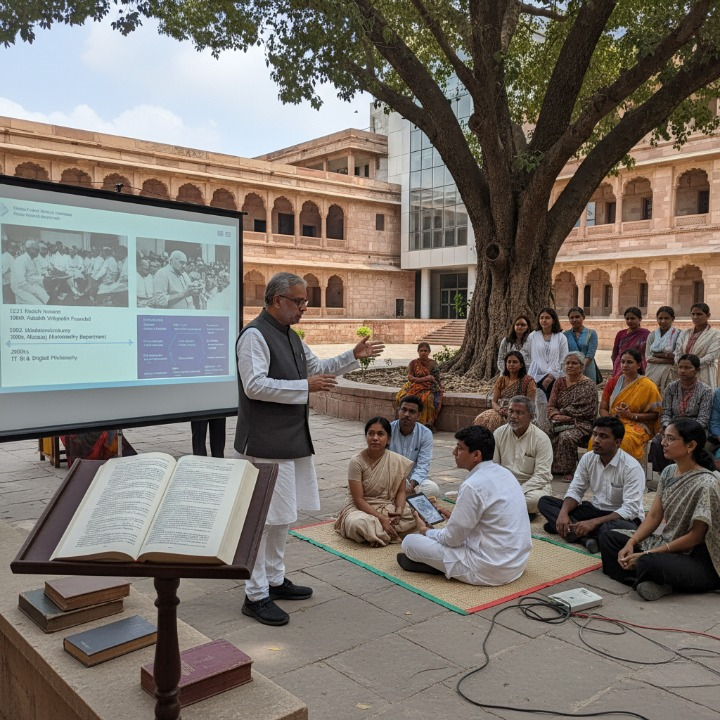Tracing the Impact of Revolts, Reforms, and Movements on Today’s Policies
Lucknow – Uttar Pradesh’s modern identity is intricately tied to its history of pivotal events that have influenced its philosophical outlook and governance. From the 1857 Revolt to the Sufi-Bhakti movements, and from the ideals of Dr. B.R. Ambedkar to the colonial imprint on governance, the state has continually evolved while balancing tradition and contemporary needs.
As debates over identity, justice, and development dominate public discourse, the lessons of history remain central to Uttar Pradesh’s modern governance and cultural framework.
Key Historical Impacts on Modern Uttar Pradesh
- 1857 Revolt: The First War of Independence, initiated in Meerut, cemented the idea of collective resistance, influencing grassroots movements across the state today.
- Bhakti and Sufi Movements: Spiritual leaders like Kabir and Tulsidas emphasized interfaith harmony, a philosophy reflected in the cultural diversity of cities like Varanasi and Bareilly.
- Colonial Administration: The British introduced legal and administrative systems, forming the backbone of today’s judicial and governance structures.
- Ambedkarite Reforms: Dr. B.R. Ambedkar’s call for caste equity continues to shape reservation policies and social justice initiatives in Uttar Pradesh.
Key Metrics Highlighting Historical Influence
- Judicial Delays: Uttar Pradesh has 1.5 million pending cases, reflecting challenges inherited from colonial judicial systems (All India Judicial Services Report, 2023).
- Education Enrollment: Institutions like Banaras Hindu University (BHU) and Aligarh Muslim University (AMU), founded on nationalist ideals, enroll over 1.2 million students annually (AISHE Report, 2022).
- Religious Composition: The state is home to 80% Hindus, 19% Muslims, and smaller minorities, reflecting a legacy of syncretism (Census 2011).
- Land Reforms: Policies inspired by post-independence movements have redistributed over 1.4 million hectares, benefiting marginalized communities (UP Land Records, 2023).
Historical Themes Influencing Current Philosophies
1. The Spirit of Resistance and Reform
The 1857 Revolt instilled a legacy of collective resistance, influencing today’s grassroots movements addressing land rights and farmer issues.
- Example: Farmer protests in western UP against new agricultural policies draw on the spirit of unity from the revolt.
2. Syncretism from the Bhakti and Sufi Movements
The Bhakti and Sufi traditions laid the foundation for interfaith harmony, crucial in a state with significant religious diversity.
- Modern Reflection: Initiatives like the Bareilly Interfaith Dialogues aim to preserve this heritage amidst rising communal tensions.
3. Equity from Ambedkarite Philosophy
Dr. Ambedkar’s fight for caste justice continues to shape policies on education and employment in Uttar Pradesh.
- Policies: Reservation systems in state universities and public services address historic inequalities.
Current Challenges Reflecting Historical Legacies
- Judicial Backlogs: Pendency in courts reflects systemic inefficiencies rooted in colonial-era judicial frameworks.
- Urban-Rural Divide: Development initiatives struggle to balance urban modernization with rural equity, a tension dating back to land reforms.
- Cultural Polarization: Rising communal tensions threaten the state’s legacy of religious harmony, inspired by Bhakti and Sufi movements.
Efforts to Address Philosophical Tensions
- Inclusive Education: Curricula at AMU and BHU integrate teachings from historical leaders like Gandhi, Ambedkar, and Kabir to foster unity.
- Heritage Preservation: Projects like the Varanasi Smart City Mission aim to modernize while respecting cultural traditions.
- Judicial Reforms: Fast-track courts and digitization of case records seek to address long-standing inefficiencies.
- Interfaith Dialogues: Government-backed programs promote harmony in cities with diverse populations.
Path Forward
- Education and Awareness: Expanding awareness of historical figures like Ambedkar and Kabir through state-funded programs can deepen cultural understanding.
- Grassroots Empowerment: Strengthening panchayati raj institutions to address rural issues ensures equitable development.
- Policy Reform: Balancing urban and rural priorities can address disparities stemming from post-independence development models.
Conclusion
Uttar Pradesh’s modern philosophical outlook is a product of its rich history of resistance, reform, and harmony. The state’s ability to draw from these lessons while addressing contemporary challenges will determine its future trajectory.
With its past as a guide, Uttar Pradesh must harmonize its traditions with modern governance to build a more inclusive and equitable society.


Leave a Reply